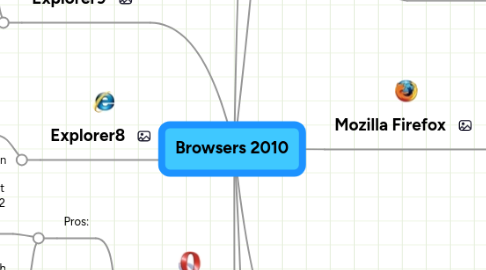
1. Define: Browser
1.1. A software application used to locate and display Web pages. The two most popular browsers are Microsoft Internet Explorer and Firefox. Both of these are graphical browsers, which means that they can display graphics as well as text. In addition, most modern browsers can present multimedia information, including sound and video, though they require plug-ins for some formats.
2. Explorer9
2.1. Pros:
2.1.1. Internet Explorer 9, a beta of which Microsoft released to the public Sept. 15, registered at 0.28 percent of the worldwide share, according to Net Applications. Last week, Microsoft said the IE9 beta has been downloaded more than 10 million times.
2.2. Cons:
2.2.1. its performance scores vaulted from lukewarm to smoking hot, vaulting well above Apple Safari and Mozilla Firefox, and posting the best comparative scores in the well-respected SunSpider test against even Google Chrome and Opera
3. Explorer8
3.1. Cons:
3.1.1. When you look at specific versions, Internet Explorer 8 saw its growth spurt continue -- rising from 31.75 percent in September to 32.04 percent in October (including IE8 compatibility mode). IE7 fell from 10.39 percent to 9.92 percent and IE6 fell from 15.55 to 15.01 percent.
4. Opera
4.1. Pros:
4.1.1. remains the overall leader with a 5.010 score. That lead is built mainly on the strengths of Opera's "pre-digesting" ability for re-usable code segments, which is strongly evident in its overwhelming SlickSpeed test scores: 18.574 versus 8.267 for the latest Chrome 8 dev build, and 8.562 for the stable Chrome 7.
4.1.2. Opera 10.6 continues to be the fastest in terms of JS execution with 246 ms
4.2. Cons:
4.2.1. Opera didn’t Compare the SunSpider results to Chrome 5, which is the fastest browser.
4.2.2. Opera 10.5 is only Stable for Windows
5. Sources
5.1. All sources must be from October/Nov 2010; minimum 5 sources, collaborative effort
5.1.1. Shorten your URLs at the following link:
5.1.2. http://bit.ly/
5.2. http://bit.ly/9MumLU
5.3. http://bit.ly/fEHJdv
5.4. http://bit.ly/92kaIw
5.5. http://bit.ly/cuHLGt
5.6. http://bit.ly/daBL3Y
6. Mozilla Firefox
6.1. Pros:
6.1.1. beta builds in the field typically have fewer extensions and add-ons
6.1.2. Firefox 4 has actually made tremendous strides in the performance department, as it had to do in order to stay competitive in this fierce environment.
6.2. Cons:
6.2.1. fails to execute the CSS selector instructions in version 2.8 of the DOMAssistant library; Beta 8's scores for other libraries are actually fair, and no other browser failed to run that library.
6.2.2. 2
7. Google Chrome
7.1. Pros:
7.1.1. Chrome's worldwide Web-browser share jumped to 8.47 percent last month, up from 7.98 percent in September. Meanwhile, IE fell from 59.65 percent to 59.26 percent in October and Firefox shrank from 22.96 percent to 22.82 percent, according to the analysis firm. Apple Safari grew from 5.27 percent to 5.33 percent.
7.1.2. 2
7.2. Cons:
7.2.1. Google Chrome also co-opts the GPU for graphics rendering (at least, that's what Google claims) but its efficiency is nowhere near that of Firefox 4 Beta 8
8. Apple Safari
8.1. Pros:
8.1.1. The browser that is now eating the dust that Firefox was eating two weeks ago, is Apple Safari hosting the dev build of WebKit
8.2. Cons:
8.2.1. IE9 is now faster than Safari 5.0
